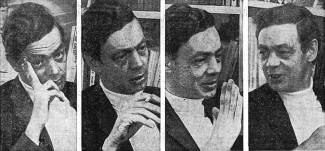Collection Name
About
James Fanto Deetz, 1930 - 2000, and "Parting Ways", the Plymouth Colony, Massachusetts.
James Deetz was born in Cumberland and in 1948 graduated from Fort Hill High School. He was known around school and the community for his love of bird watching, butterfly collecting, and thespian pursuits. Dr. James Deetz received his undergraduate and graduate degrees from Harvard, and in his own words was "an early case of affirmative action, providing for the admission of hillbillies to Ivy League institutions."
This Cumberland native and anthropologist eventually became known as one of America's greatest archaeologists and the "world's leading historical archaeologist", a field of study in which he is considered a founder. A writer, award-winning scholar, and professor at some of the nation's leading universities he is still considered to have had an unequalled impact upon today's interpretive living history museums.
James Deetz, a white man from Allegany County, is included here for his work on "Parting Ways", a small African-American community that was established in 1794 in Plymouth, Massachusetts. The original excavation work was undertaken as part of the Plymouth bicentennial celebration and under the auspices of the Plymouth Bicentennial Committee on Afro-American History. Though its initial objective was to clean up the grave sites where the former occupants were supposedly buried, it would eventually turn into a full-scale archaeological project which took two summers to complete.
In the words of James Deetz, "But to be honest, it was as much as anything, an effort to heighten the visibility of African-Americans in Plymouth Colony and their history, one that reaches back to at least 1634..." Additional information on "Parting Ways", including the involvement of James Deetz can be found at the website Parting Ways, Sharing History... Enriching the Future.
An excerpt from an address by Dr. Deetz and touching upon his work and its significance follows:
Parting Ways is a very special site, in that it was occupied by at least three families of African-Americans who were free of those constraints which might have been imposed on them under the institution of slavery. At the same time that the African-American residents of Mulberry Row, Carter's Grove, and Cannon's Point were attempting to cope under what must have been very difficult conditions imposed by Plantation slavery, the occupants of Parting Ways, marginal as they may have been to the dominant European-American community, at least were able to organize their world on their own terms, and the material evidence of this organization is to be seen in the archaeological record. Each constituent element of this record, taken alone, is not totally convincing, although powerfully suggestive. Taken as a group, as an expression of African-American culture as it was to be seen in early nineteenth century Massachusetts, it is, in my opinion, not only convincing, but an expression of a set of beliefs not only different from the dominant European-American culture, but coherent in its own right, and attributable to the African heritage shared by Cato, Plate, Quamany and their families.
On October 5, 2012 James Deetz was posthumously inducted into the Fort Hill High School Hall of Fame. The induction honor took place at Greenway Avenue Stadium in conjunction with the school's 75th anniversary.
The Plymouth Colony Project, Cultural Dimensions of Ethnicity in the Archaeological Record, by James F. Deetz. Keynote Address, 28th Annual Meeting of the Society for Historical Archaeology, Washington, D.C, 1995. Excerpts used here through the courtesy of Patricia Scott Deetz and Christopher Fennell.
Photograph provided by Patricia Scott Deetz
